
"WE ARE THE EARTH" - SEPTEMBER 2021
Let's walk together - Letter September 2021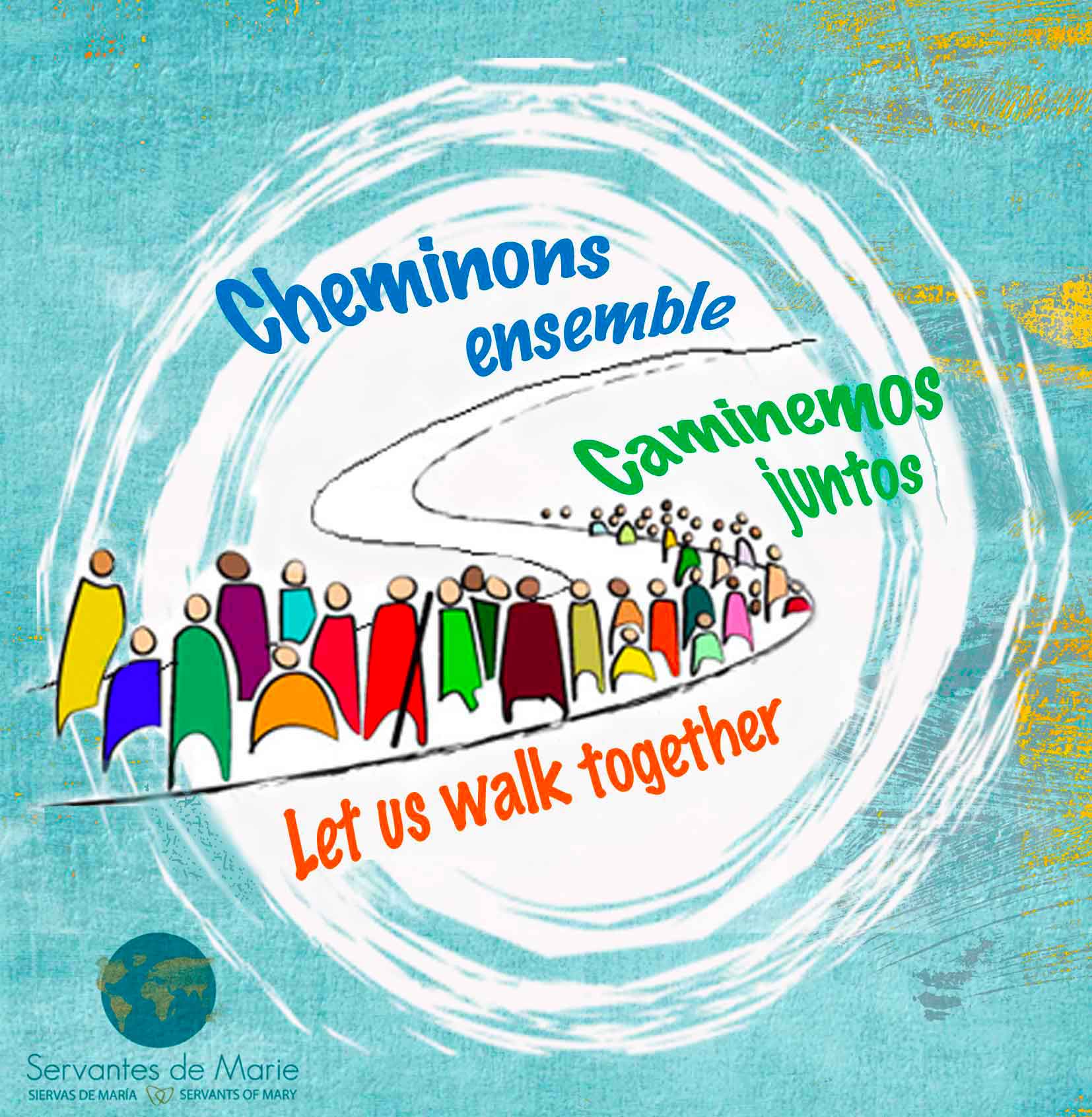
Hello dear readers!
Thank you for your welcome, many of you are reading us in several continents.
We are the Earth
The theme of the letter in June was "integral ecology" in the light of Laudato Si'.
In the sixth chapter of this encyclical, "Education and Ecological Spirituality," Pope Francis invites us to convert; it’s quite a challenge, but also a re-energization.
Ecological conversion is not a conversion to ecology, it is a new way of living the Christian faith today, a new relationship with God from the point of view of the link with creation, a "reconciliation with creation" according to the Australian bishops.
1. The Pope's words
Some extracts from Laudato Si' :
§202 : Many things need to be reoriented, but above all humanity needs to change. The awareness of a common origin, of a mutual belonging and of a future shared by all is necessary. This fundamental awareness would allow the development of new convictions, attitudes and forms of life. Thus a great cultural, spiritual and educational challenge, which will suppose long processes of regeneration, is highlighted... the ecological crisis is a call to a deep inner conversion.
§209 : Young people have a new ecological sensitivity and a generous spirit, and some of them fight admirably for the protection of the environment; but they have grown up in a context of great consumption and well-being that makes it difficult to develop other habits. This is why we are facing an educational challenge.
§213 : A good school education, from the earliest age, sows seeds that can produce effects throughout a lifetime.
§216 : The great richness of Christian spirituality, generated by twenty centuries of personal and community experience, offers a beautiful contribution to the attempt to renew humanity ... The Gospel has consequences for the way we think, feel and live.
§217 : Therefore, they need an ecological conversion, which implies allowing the full consequences of their encounter with Jesus Christ to flow into their relationships with the world around them. Living the vocation of protectors of God's work.
§219 : The ecological conversion required to create dynamism for lasting change is also a community conversion.
§220 : Ecological conversion leads the believer to develop creativity and enthusiasm in order to face the dramas of the world... It implies gratitude and graciousness, that is, recognition of the world as a gift received from the Father's love, which results in gratuitous attitudes of renunciation and generous attitudes even if no one sees them or recognizes them.
§222 : Christian spirituality proposes a growth through sobriety and an ability to enjoy little.
§223 : Sobriety that is lived freely and consciously is liberating.
§225 : Nature is full of words of love, but how can we listen to them in the midst of constant noise, permanent and anxious distraction, or the cult of appearance?
2. Laudato Si' in action : "the little guide to ecological conversion"
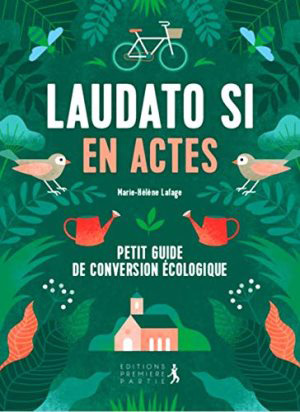 This is the title of a book written by Marie-Hélène LAFAGE, urban planner and consultant in local politics, columnist for the newspaper "La Croix".
This is the title of a book written by Marie-Hélène LAFAGE, urban planner and consultant in local politics, columnist for the newspaper "La Croix".
For her, ecological conversion requires immediate action and a questioning of the way we live our faith, an interior conversion of our relationship with living beings.
The encyclical leads to a new relationship with oneself, with the other, with the world, with creation, with God. Man is not above creation, he is part of it;
Jean-Louis ETIENNE, doctor and explorer, says that ecology is a spiritual adventure, which nature is the largest mutual insurance company in the world whose future depends on the contributors.
As in previous issues, we will talk about pillars. According to Marie-Hélène LAFAGE, the pillars of ecological conversion are :
- the inner and spiritual conversion ,
- the change of vision of the world ,
- a renewed link with Creation ,
- action and change of lifestyle ,
- community conversion,
- joy and personal fulfillment.
It also gives several orientations for conversion:
- faith: it is a matter of appropriating the gospel of Creation ;
- reflection: as everything is linked, Pope Francis presents a new vision of the world where the economic, social, environmental and spiritual dimensions respond to each other. The pillars of sustainable development that we mentioned in the letter of March;
- action.
There must also be a conversion of educational methods because as the agro-ecologist Pierre RHABI says:
"If instead of asking ourselves the question What planet will we leave to our children?, we would ask ourselves What children will we leave to this planet?".
3. What did father CESTAC say?
Before time, father CESTAC had understood everything. It is nature that has been the source of conversion and redemption for many of the young girls welcomed at Notre Dame du Refuge. The spiritual journey of the first Bernardines is a perfect example.
As "everything is given", because Creation is a gift received which incites gratitude and gratuity, it has known how to recognize the value of the people welcomed. Gratuity, freedom, and good will were the three conditions of welcome.
As "everything is connected", he was a promoter of integral development, inviting us to take into account all dimensions of human life as well as all creatures.
As "everything is fragile", fragility is an invitation to respect but also to welcome possible new beginnings, beyond death. The rebirth of people excluded from society, welcomed by Father Cestac, with the motto, once they became Bernardines: "God alone".
We read in paragraph 205 of the encyclical "all is not lost: human beings, capable of degrading themselves to the extreme, can also... opt again for the good, regenerate themselves... and initiate new paths towards true freedom".
Father CESTAC in front of the young prostitutes, in 1842, thought: "At the sight of these unfortunate beings that the society criticizes, he saw them degraded, given up to all the vices... he saw in several... a superabundance of courage and energy overflowing all towards the evil and he believed that one could direct it towards the good". In founding Notre Dame du Refuge, he offered them "a family life and a wise freedom".
4. Testimonies, projects
For Father Cestac, education was fundamental. He saw many young girls being abused because they were not educated. Today, schools under the tutelage of the Congregation of the Servants of Mary exist throughout the world with educational projects enlightened by the charisma of Father Cestac.
In his time he wrote: "The child is like a precious plant which must one day bear great fruit but which must be developed by a wise, intelligent and sustained culture" (10/02/1867).
We propose you some actions carried out in Argentina, in India and in France.
IN ARGENTINA
INSTITUTIONAL 3R PROJECT: REDUCE, REUSE, RECYCLE
The process of reuse is defined as the action of reusing goods or products. Recycling is the transformation of waste to be reused in its original purpose or for other purposes.
The project was proposed to ensure that parents and students at the initial, primary and secondary levels participate responsibly in the school's environmental program on solid waste management. To this end, awareness-raising activities were carried out at all three levels and baskets were set up at different locations in the school buildings to sort and separate waste.
Work has been done on the adoption of environmental habits that contribute to the care of the institutional environment through the management and reuse of solid waste. The educational community was also made aware of the possibility of giving materials more of a useful life. Finally, the students were introduced to the specific use of certain solid wastes as raw materials for the production of new and different products.
PROJECT AMA-PETITES MAMANS
Schools La Milagrosa, Hermanas de Betania and Euskal Echea
During a year in which we are still overwhelmed by the remnants of a pandemic that has crossed borders, social classes and ages, and also in a year in which the law on abortion has been approved in our country, once again the charisma of our "Good Father" is present in the midst of a need that we cannot ignore: the vulnerability of young teenagers from very disadvantaged neighborhoods, who have become pregnant in different circumstances.
Petites mamans, Ama in Basque, is the name given to the group of 7 little mothers, all of whom are only 14 years old and have recently become mothers. Children are fruits of the pandemic.
The project consists of fraternally accompanying these young women by getting together with senior students to share afternoons of talks and snacks.
As Father Cestac would teach us, "everything is given", "everything is linked", "everything is fragile"...
The students of the school take care of the babies and their mothers. In addition, they are given school support so that they do not lose their schooling and they are thinking of adding nutrition and vocational training workshops. The students of the school who saw the reality of these mothers and fearlessly went out to meet this challenge initiated all of this.
Without realizing it, with this project, we all said together: Yes, to life, regaining dignity and joy of livinges, to life, regaining dignity and joy of living.
This is a project in which we all win.
IN INDIA
LE CLUB NATURE
St. Joseph's Matric Higher Sec.School, Mulgumood
- Nature cares us,
- Nature protects us,
- Nature soothes us,
- Nature comforts us,
- Nature loves us.
We, the Josephites are elated to have a glimpse of the origin and the activities of our Nature club. It took its origin in our campus from 2010 under the guidance of Sr. Mercy Abraham, the principal of St. Joseph’s Matric Hr. Sec. School, Mulagumoodu.
The purpose of the club is to create awareness of environmental issues such as protection, conservation, preservation and restoration.
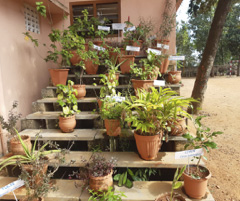
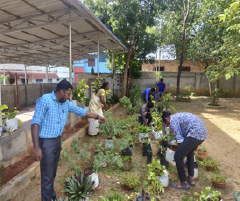
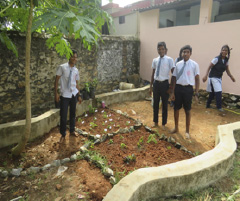
The club will empower students to participate and take up meaningful activities. And projects through which they promote sound environmental behavior. Teachers and students who are environmental advocacy and aware are encouraged to join.
Nature club gathers its activists every Friday. They were assigned to take care of our indoor and outdoor garden, medicinal garden and prepare vermicompost. They highlight the botanical names and medicinal use of every medicinal plant.
A few field trips were given to the nature club activits. In the last meeting they planned to extend the area of the garden. The nature club inculcates a green environment in young minds.
IN FRANCE
INTERVENTION PROJECT RESCUE OCEAN
Ecole Sainte Foy in Toulouse (children aged 6-7)
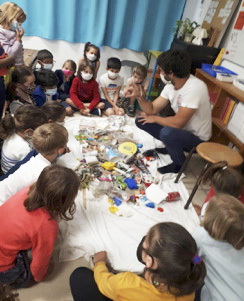 This Tuesday, June 29, 2021, our class of CP had the chance to welcome Mayeul and Marion who came to speak to us about the protection of the oceans. Mayeul and Marion are volunteers of the Association Project Rescue Ocean Association. They give their time to travel from school to school in order to raise awareness of the state of the oceans and the environment.
This Tuesday, June 29, 2021, our class of CP had the chance to welcome Mayeul and Marion who came to speak to us about the protection of the oceans. Mayeul and Marion are volunteers of the Association Project Rescue Ocean Association. They give their time to travel from school to school in order to raise awareness of the state of the oceans and the environment.
Mayeul and Marion first introduced us to the association. They explained to us that even if there is no sea in Toulouse, we can act to protect the oceans from pollution and save the animals. They showed us pictures and videos of the different actions carried out by the members of the association. People gather to clean up the beaches, rivers, the sea, the ocean... Then, we thought about what is pollution and Mayeul and Marion gave us the definition. In order not to cause pollution we must recycle, reuse, replace.
Then we reflected on what we, as children, could do to take action. We came up with three solutions:
- not to throw away our waste
- to pick up the waste when we walk, when we go to the sea or in the forest etc.
- to do prevention by explaining to our friends that: a waste = an animal in danger.
Then, Mayeul presented us a heap of waste, all found in the sea or on the beaches. The quantity is enormous! We tried to understand where all this waste comes from and what impact it has on the environment and the animals. We were very surprised to realize that a small plug or cotton bud can cause a lot of damage.
We saw that everyone is concerned even if we don't live near the sea. A piece of waste thrown away in Toulouse can end up in the ocean because the path of the water goes to the ocean:
a waste in Toulouse => falls in the stream after the storm => the stream brings the waste to the river => the river carries the waste to the river => the river carries the waste in the ocean => the ocean is polluted and it is a danger for the animals.
We ended the session with a drawing to show what we had learned and what we could do. Mayeul presented our drawings to the class and then awarded us with "Ocean Rescuer" diploma now officially involved in saving the environment.
Thanks to Mayeul and Marion and thanks to Project Rescue Ocean! You can count on us!
THE PEDAGOGIC NURSERY AND THE NESTROOMS
Stella Maris School Set of Anglet (children aged 10-11)
A class of CM2 of the Stella Maris School of Anglet, in action in the ecological park Izadia of Anglet. After the fire that occurred on July 30, 2020, the pine forest of Anglet has been heavily impacted. In this context, the Stella Maris School quickly proposed to intervene within the framework of a program of actions with the pupils in order to participate in the restoration and the regeneration of this damaged part.
The overall objective of the project is to understand the biodiversity and the resistance of the forest by creating a nursery. It is tested on an experimental and educational basis in the park. The program for the year 2020/2021 includes: learning about the biology of a plant, choosing local species, understanding the role of a forest, carrying out a planting site and holding an informative stand during the festival of nature. Students planted about 30 plants on 12/17/2020.
The birds also suffered. Another project was born: the installation of nesting boxes for the birds to return.
The objective of this second project for the 2020/2021 school year is the knowledge of nesting boxes and bird species, the identification of the various species of titmouse, notions about the pine processionary caterpillar which destroys pine trees and whose natural prey is the titmouse
A song was written by the children and recorded with Philippe ALBOR
We don't have time! We don't have time! No, no, no! We don't have time! … To spend the time to complain, to grumble , To see on the road only the bad side , Always negative, in the dark, sleeping. It's time to get out in the sun! | We don't have time! We don't have time! No, no, no! We don't have time! … To stay glued, taped to our screens , Hyper inactive, downright dependent , To follow the world without being part of it. It's time to taste real life! | We don't have time! We don't have time! No, no, no! We don't have time! … To shout, to scream, to make a fuss, To want to hurt, to look for a fight , To ignite hatred, and endless wars . It's time to reach out! |
Numerous actions are carried out at Stella Maris on the ENVIRONNEMENTAL level, here are some examples:
- Awareness of waste sorting: intervention of the Bil Ta Garbi syndicate which works for the reduction, sorting and recovery of household waste, with students from the professional college. These students have become "sorting ambassadors" and are in turn raising awareness among kindergarten children about waste sorting.
- Awareness of food waste: "Bad fruits, not so bad!", BTS students (Brevet de Technicien Supérieur) make kindergarten children aware of food waste and show them that damaged fruit is still good to eat.
- Recruitment of 2 civic service volunteers for the school in the field of "Environment": the Civic Service is aimed at young people from 16 to 25 years old, up to 30 years old for young people with disabilities. It allows to commit oneself without any diploma condition for a period of 6 to 12 months in a mission of common interest within an association, a public establishment, a community... in France or abroad and in 9 fields of action: solidarity, environment, sport, culture, education, health, emergency intervention, memory and citizenship, An allowance of 473.04 euros per month is paid directly to the volunteer by the State, regardless of the weekly duration of the mission (it is 24 hours over the school year). The host organization also pays the volunteer a benefit in kind or in cash of 107.58 euros, corresponding to the cost of food (meals) or transportation. This benefit can be paid in different ways (meal vouchers, access to the canteen, reimbursement of expenses, humanitarian aid, etc.).
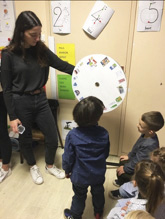
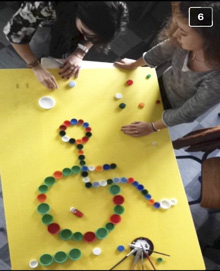
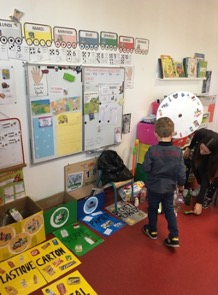
In concrete terms, his or her missions for the school complex, in conjunction with the principal for the school and the teacher responsible for sustainable development for the middle school and high school, are to :
- raise awareness and educate young people about sustainable development ,
- contribute to the training of eco-delegate students ,
- bring to life existing actions and partnerships: selective sorting, collection of plastic plugs, collection of cigarette butts, "tree6clope"...
- develop new actions in the school complex ,
- setting up eco-delegates in the classes: the civic service volunteer visits the classes and explains the sustainable development approach and the missions of an eco-delegate. 66 eco-delegates are recruited in high school and 126 in middle school. The eco-delegates are both co-pilots and ambassadors of the educational projects carried out within the school. They participate in the steering committee of the projects, inform their fellow students about the progress and encourage them to get involved.
To be a class eco-delegate is to:
- being a student who respects the environment and sets an example ,
- raising awareness among classmates about daily gestures (turning off lights, checking that windows are closed in winter and that radiators are well regulated, installing waste sorting garbage cans in the classroom, etc.)
- be a force of proposal (proposing initiatives and actions, such as "green walks", etc.)
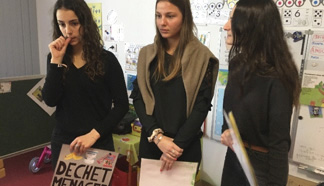
Examples of missions carried out by eco-delegates:
- awareness of the economy and recycling of paper (with the making of garbage cans for the collection of used paper in the classes); selective sorting, compost.
- making of pocket ashtrays for cigarette butts; collection of cigarette butts for the Tree6clopes association. Tobacco, paper and ashes become non-food compost for golf courses and public gardens. Filters (cellulose acetate) are transformed into plastic bars to make tables, benches, outdoor and urban furniture.
- collection of plastic caps: for the association "Bouchons d’amour". These caps are then resold and allow the acquisition of equipment for disabled people.
Other actions are carried out at the SOCIAL level:
- creation of a shared garden: intergenerational meetings between the children of the CE1-CE2 classes and the residents of the EHPAD Mariama on the Domaine du Refuge,
- shared tea party between residents of the François de Paul residential, Lycée students and students from the IME le Nid Basque,
- creation of an association at the school "Share to Smile" whose aim is to promote solidarity actions by financing mutual aid projects (sale of pancakes, garage sale, making of calendars...) to help the MARPLE Afrique Solidarité association; collection of socks to help the Gizaide association in Spain...
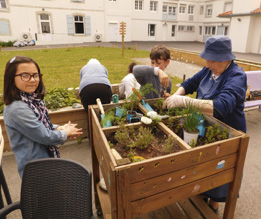
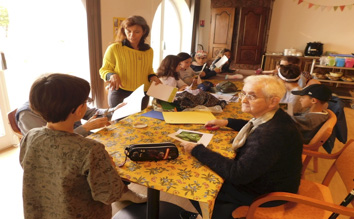
Also to be added are the works carried out on the school complex for energy savings (double-glazed windows, LED lighting...), as well as for water consumption savings(showers in the boarding school, aerating foam tips on the taps, rainwater collectors for the biodiversity zones... )
In 2021, the Stella Maris school complex was awarded the E3D label (Établissement en Démarche Globale de Développement Durable) by the French Ministry of Education for all its environmental and social actions. It has also been awarded the LPO (League for Birds) "Refuge Biodiversity" label since 2020.
UGLY FRUITS ARE NOT SO UGLY!
- Goals: making children aware of food waste. To show that damaged fruits are still good to eat.
- Procedure: we divide the groups of children into two groups. Two facilitators in each group. We begin with the blind tasting with damaged fruits, then we will make the realization of skewers with "ugly" fruits. We finish with an awareness on waste.
- Assessment: Activity assessment - Blind tasting - Fruit brochette
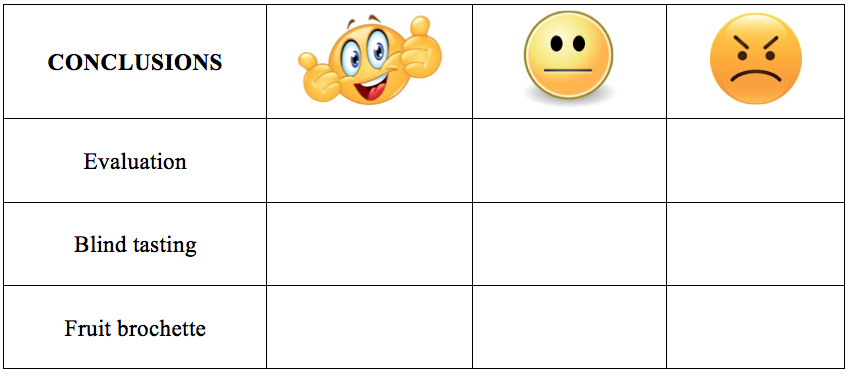
ELSEWHERE?
We invite you to share with us other actions, other projects carried out in other schools or in other places.
5. Reflections and reactions
And for each of us?
To what ecological conversion can we commit today?
"For integral ecology is made up of simple daily gestures by which we break the logic of violence, exploitation and selfishness."(§230).
How can we live more simply?
What can I do, what do I do at my level in my everyday life? Food, waste, travel, economic systems, etc.
And if we ask ourselves the question: what is the use of this, what can I do? The answer is in the Amerindian legend that Pierre RHABI often tells:
“One day, the legend says, there was a huge forest fire. All the animals were terrified, appalled, and watched helplessly as the disaster unfolded. Only the little hummingbird was active, fetching a few drops of water with its beak to throw them on the fire. After a while, the armadillo, annoyed by this ridiculous agitation said to him: Hummingbird, you are not crazy? It is not with these drops of water that you will extinguish the fire! And the hummingbird answered him: I know it, but I make my share.”
"May our concern for this planet not take away the joy of hope, for in the heart of this world, the Lord of life continues to be present." (§243)
To conclude this issue, we offer you the Ecobeatitudes written by the Catholic teaching of the Diocese of Lyon during the Laudato Si' conferences (3 October 3, 2018) :
- Blessed is the one who marvels and knows that created by God, he is loved unconditionally by him .
- Happy the one who pays attention, listens and knows how to say thank you .
- Blessed is the one who knows how to take care of himself, of others and of the relationship.
- Happy is the one who is attentive to the poor and to every fragility .
- Happy the one who respects life and the dignity of Man, his culture, his identity.
- Happy is the one who knows that everything is linked and that he can only build with others .
- Happy the one who puts the good of the whole before his own interest.
- Happy the one who puts his work and technology at the service of Man .
- Happy the one who feels responsible for the common house and preserves nature .
- Happy the one who relies on sobriety, knows the importance of time and adopts a renewed life style.
- Blessed is the one who promotes an integral ecology at the service of the growth of Man, body, heart and mind .
- Happy the one, who hopes, refuses to be indifferent and commits himself.